Inside the DIY rave scene that’s reshaping Cornwall’s musical heritage
Since moving to Falmouth, Hockeysmith and her eel collective have tapped into a rich vein of progressive energy
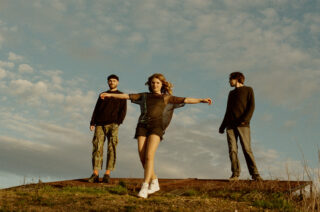
Since moving to Falmouth, Hockeysmith and her eel collective have tapped into a rich vein of progressive energy
The holed stone at Mên-an-tol stands thirty miles north of Falmouth, guarded by ailment-curing fairies, piskies and clairvoyant spirits. Passing a naked child through the stone three times and dragging them through the grass eastwards on the Penwith moors will cure scrofula or rickets; women who pass through the hole seven times backwards at full moon hoping to fall pregnant will have their wishes answered; men suffering from rheumatism or spinal problems who skulk through the hole nine times against the sun will leave standing tall.
An hour’s journey to the opposite shore forgets the county’s megalithic folklore by way of the rugged coastline, messianic ocean tides and yawning estuaries, the views interrupted occasionally by broken railway tracks along the cliff edge from Cornwall’s once-thriving copper and tin trade, now sunning markedly less-lucrative china clay in open carriages. Times are changing; today, the holed stone at Mên-an-tol is being used as a rubbing post for cattle.
At land’s end, Cornwall’s musical tapestry has always cultivated a creative pariah – a feng shui, perhaps, harmonizing boredom with nothing at all, rewarding those at home in their own heads. Sea shanties that kept fishermen working to a rhythm gave way to the acid house scene of the late 1980s, Rephlex Records and a Redruth boy called Richard D. James, followed by swathes of guitar bands at the town’s Green Room. Now, in the neighbouring Falmouth, a fervent subculture of DIY electronic music is breaking through again in the eel collective, founded by Annie Hockeysmith and Łukasz Kucharski. It’s music, they say, inspired by the dark and natural ambiences of north-facing caves that are maws to the treacherous sea, and raves in the woods where the air hums with the electricity of distorted kick drums and subterranean bass.
On the meadows up from Grebe and Falmouth Bay, Annie Hockeysmith’s home, a 1980s-style American Winnebago bus stands next to a barn in a caravan park, on a gentle decline to the sea. “We don’t know how it got here,” she grins, in a bright red sunhat, adjusting her Webcam to show a sand-filled kitchen, a bed that comes down from the ceiling and a cabin-like living area, made strange only by the existence of an elevated steering wheel coming out of a wall where a television would be. “It’s too big to move,” she says. “The farmer here would have to get the tractor out and we don’t want to do that again.”
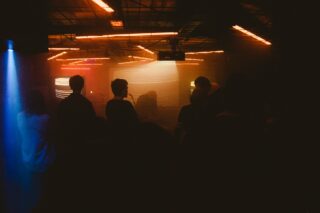
Hockeysmith began as a project long before Annie and her sister Georgie moved to Falmouth, back when the pair lived together in Brighton and wrote the darkwave sleeper hit ‘But Blood’ in 2012. “We just put it up online and then we had this gig, and loads of booking agents were showing up, people were writing about us and we were just like, ‘it’s happening!’ But we only had this one song and didn’t know who we were yet.” In the following year, everything and nothing happened at once. Indie heavyweights 4AD and Double Denim got in touch with offers of management, they were being booked for festivals and getting big press attention, but the external forces sat uneasily with them and they didn’t release music for another year.
“It just didn’t feel right to me and Georgie,” says Annie. “I don’t know how I feel about it now, looking back, because I think… wow, to get that kind of attention is really special. But we didn’t go with it, we thought we were being pushed in a direction, being made to look really hipster. We shot the video for ‘But Blood’ on the farm and it just felt uncomfortable, like we’d lost our underground edge.”
It wasn’t until they were booked to play Distortion in Copenhagen that the sisters recalibrated and found inspiration again. “There just wasn’t anything like that in Cornwall at all,” Annie says. “There was no electronic music, it was just indie bands and we felt so uninspired. But in Copenhagen we saw these amazing punk bands and techno artists. That was the first time we saw collectives working together, and it was so artful and had nothing to do with the industry side that we were getting caught up in.”
Desperate to live there, the band relocated, but the physical and mental distance between Hockeysmith and their team was expanding. “Things sort of fell apart a bit,” Annie laughs. “One of my biggest heroes is Patti Smith and she talks about it in Just Kids – you’ve got to protect the name and the quality. Even when other people get involved, you know in your heart if it isn’t you. I’m proud that we’ve always been in control of what we sound like. When we showed our team the new music they didn’t think it was right; they wanted to produce us in a certain way and that was the end of it.” After a few years in Copenhagen, the band split up, citing illness and stress. Georgie decided to pursue a psychology degree and a career in neuroscience, and Annie moved back to the bus in Cornwall to finish the Tears At My Age EP as a solo artist.
From the self-described “Kylie-on-acid” banger ‘Lonely Loving Me’ to the shoegaze and slowcore-indebted title track, the Tears At My Age EP’s paean to Cornwall was as cowed but irrevocable as Aphex Twin’s Richard D. James Album. “I wasn’t even sure whether I could carry on with the Hockeysmith name,” she says, “but I really liked gigging on my own, and then I decided to do the popular music course at Falmouth University, and eel was born.”
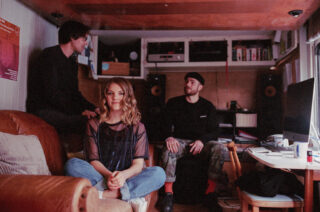
The first “e” stands for earth, the second for “eel” and the “l” for “loop”. The underground tunnels mined by this collective to spread their music far and wide is the Falmouth University Share Drive. The first time I was sent their new compilation, men an tol, I was blocked access for entering the incorrect university email address. Its fourteen tracks write the strangest postcard from Cornwall, from Earthnut’s melancholic UK garage on ‘Tecca Don’ to the shimmering clack and welter of Hallion’s uncomfortably titled ‘Covid32’, and the ethereal ambience of Inka Upendo’s ‘Waterlevel’ that plays calmly by the drone-heavy reverb and vocal loops of MAYBELLEENE’s ‘Nyctalopia’. The three standing stones of Mên-an-tol are digitized on the artwork, now representing three stars in Centaurus under the shadow of a splattered Gameboy fairy; Lupus is shown as a ground squirrel.
A highlight of the release is ‘Late Night Ventures’ by C O N T X T, the Falmouth-based project of George Townsend. It was written during the first lockdown when he returned to his family home in the Isle of Wight, surrounded by water and countryside just as in Falmouth, but with a completely opposing atmosphere – “a creative dead zone,” he says on the phone later. Clouding the outlines of rave and ambient, C O N T X T’s sampled live drums morph between deconstructed future garage and breakbeat. “It represents the madness I was feeling at a time,” he says, desperately trying to ground himself away from the Cornish scene. “I wanted it to be off-grid and not follow a conventional beat pattern; it sounds out of time when you play it next to something else, but in time with itself.”
“I feel like we’re all kind of drawn to dance music,” says eel co-founder Łukasz, joining on Zoom from his current base in Tottenham, “but more so playing it live than DJing. I feel like there’s more people who want to do live dance music. A lot of events you find 90% of the lineup is DJs. That’s the difference I’ve felt from us compared to other collectives.”
“When you come to an eel night everyone’s got their gear out and playing with electronics and working on the performance,” Annie agrees. “Terry Bliss has a microphone set up. Oh Mr. James comes down with all his modular synths. We’ll do some DJing afterwards, but being able to see the producer doing it all live brings a real edge to it.”
The fondness with which C O N T X T speaks of the eel nights is rooted in the quality of the music, of course, but more generally about the atmosphere created among friends. “There weren’t many opportunities for electronic artists to get gigs in Cornwall, but eel gave us a space for us to work. And it was just the first time I found my people. No one’s there to sling drugs or hook up with people. There’s a real passion with the artists and those who attend.”
“If I can’t classify what the genre of music is, I usually like it a lot,” says Łukasz, emphasising how important inclusivity is to eel. His own door into dance music as a converted metal-head was opened by a Polish synth-pop band called The Dumplings. “Most of my favourite albums try different approaches and different styles. I really love musicians that will just try out loads of things and bring loads of elements into the music, and different emotions. I get quite bored easily,” he laughs. “It can’t be alienating. With a lot of experimental music, it’s great, but people need a point to grab onto that resonates. Being from Cornwall we have to try and get people into these events, you can’t afford to be too far up your own ass.”
“When you look at the photos from our gigs everyone’s smiling and having a great time,” Annie says. “There’s something to grab onto. It’s catchy and crazy stuff, really danceable and makes for great parties. Everyone gets fed up with boring DJs in this town, and a lot of people haven’t seen anything like this before.”
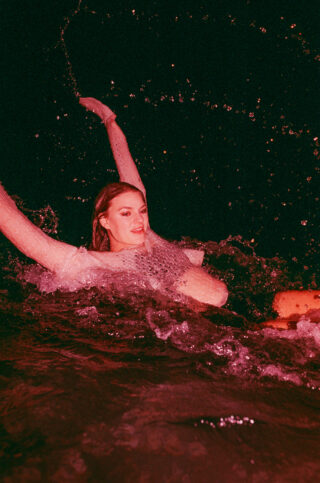
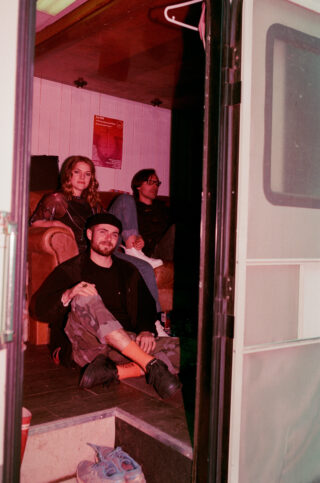
Occasional Hockeysmith guitarist and producer, Peasy, is one of the few members of the collective who grew up in the county. His solo project Seamouse is named after a pretend creature – half rat, half seagull, an apex predator the size of an armadillo. “I used to water hanging baskets as a job,” he explains, “and it’d involve starting work at 4am. I was still partying a lot, going to work with little or no sleep. We’d just talk about completely random shit in the back of the van and I decided to use it for music.
“It feels like eel has actually got its shit together and is becoming something that can be recognized as a proper label that puts out quality music,” he says. “It’s also turning Cornwall into a scene where you’d want to go to experience live electronic music, not just mainstream dance or generic house. Every night we put on is a real range of stuff; it’s not just one genre. You know, sometimes you get drum’n’bass nights or jungle nights, but eel’s never done that. Anything goes.”
Annie’s own taste naturally varies. She’s sampled York’s chillout-trance hit ‘On The Beach’ but listens closely to Fontaines D.C.’s lyrics. “I love ’90s rave music and IDM, but also the new Burial, Bladee, Claire Laffut. And then Sophie, A. G. Cook, Jimmy Edgar…” she reels off artists she’s been listening to, realising her own music has lately orbited a pop-heavy space. “I’m so much happier and more confident doing the pop thing now than when I was 22,” she says, talking about her most recent releases, ‘Down Love’ and ‘Hyper Kobra’. “I guess it’s just experience and knowledge and more time finding out who I am and what music I want to make. As time has gone by I just feel more in control of what I do and more open to express myself. When you’re starting out it’s all just intimidating, and if you’re not coming across as yourself it shows.”
That authenticity is an important part of eel’s sustainability. The origin story can be traced back to a free party in the barn by Annie’s bus that has become its own piece of Cornish folklore within the DIY scene. “I like to call it my Super Sweet 16,” she laughs, telling me how she’d wanted to get to know the other musicians studying at Falmouth, and had reached out to Łukasz to see if he’d play and bring people down, having heard he was a cool DJ. A while earlier, she’d unknowingly befriended Aphex Twin and his wife, playing at a fish factory. “He heard us play ‘Let’s Bang’ for the first time and thought it was a cool tune, and then we just talked about his synth collection, Trego Mills, living in caravans… it was just a really nice natural chat. I didn’t really know much about him.
“Anyway, it was a freakishly hot day in May,” Annie says, “and I asked Richard if he wanted to play a secret set at the barn. He thought it could be fun and brought his kids down. And then there was this rumour that he was playing and before I knew it the whole barn was packed out and full. We arrived in the tractor… it was the dream gig. Richard played at the end and you can imagine the reaction – people couldn’t believe it. And everyone was just hanging out on the hay bales and having a nice time. And then night came and Alan the farmer said, ‘right it’s midnight, now can we get this guy off’ and he cut the power in Richard’s set and said he’d get the police round soon.
“To be fair,” she adds, “we got so many complaints that the next time I tried to organize an eel night there… well, we haven’t been successful since. It was a one-off treat. There were so many people on the campsite helping out with lights and stuff saying stuff like ‘This music is shit’, ‘What’s all this noise?’, ‘You call this music?’”
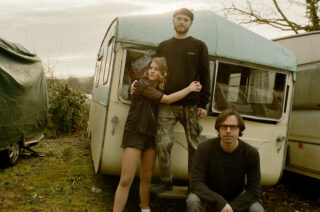
But something about Cornwall has inspired all this esoteric noise. Maybe it’s the place, or maybe it’s the creativity its geological separation forces artists into. “There’s not much going on here,” says Peasy. “There’s no pressure to fit into certain criteria or to think this is the cool thing. There’s no pressure to create anything other than the pressure of actually creating it. There’s something to be said about living in the city, for sure, you’ve got that energy and there’s always something happening, but in my experience you can’t get away from it in the same way. Knowing that the woods are a ten-minute walk away and you don’t have to be around anyone… The solitude here is unlike anything.”
“You are just so isolated here,” adds Łukasz, “it feels like you are at the end of the world, everyone’s in their own head and you can build up these ideas that maybe don’t appear in a bigger city where you’ve got 200 parties every weekend.”
“I mean, that’s why we came down here,” says Annie, thinking back to the time she and her sister relocated. “It’s beautiful, we could get a caravan quite cheaply and have this creative lifestyle. We never went to London because we couldn’t afford it. We thought that to be an artist you have to live as cheaply as possible and have as much time to work on your creative stuff. We also found… I mean it was the same in the ’90s as it is now, but there are no venues here. To put on gigs we’ve had to put speakers in certain places, set up your own little DIY rave, and you’ve got these amazing outdoor locations with beautiful backdrops.”
“Being in Cornwall makes it such a big adventure every time we do a show,” Łukasz smiles. “Half of our events seem to get cancelled due to massive storms. Nature’s the creature to avoid; having to get in equipment when the wind is strong enough to blow you over and it’s hard to even stand up. When we put on Iglooghost and BABii, all the flights here got cancelled, so they had to take a train instead and we thought they’d get caught in flooding. They made it, but Annie had to drive to Truro to get them, and then it took them 24 hours to get home the next day.”
“Yeah,” she laughs, “they stayed on my bus.”
Over hours of conversation, no one in eel is able to pinpoint the creative nucleus of Cornwall’s DIY rave scene. There’s no venue beyond the pop-up nights at the barn, no meeting ground beyond the University. It doesn’t matter where people create their sounds, what it sounds like or what inspiration it draws from. Annie’s new music has its roots in the French countryside; an acoustic album is on the cards, penned partially at a chateau in Burgundy where she was living as a family’s English teacher, while playing sessions with Borussia at the Ed Banger studios in Paris, 500 miles from Mên-an-tol.
“There’s got to be some energy here,” says Annie, knowingly playing into the folklore of the place. “Cornwall’s amazing as a base but sometimes you feel the urge to go out exploring into cities. People come and go but Cornwall doesn’t really leave them.” It’s a phenomenon that makes eel perhaps the most isolated collective in the world – but coming back to the party is the only thing that matters.